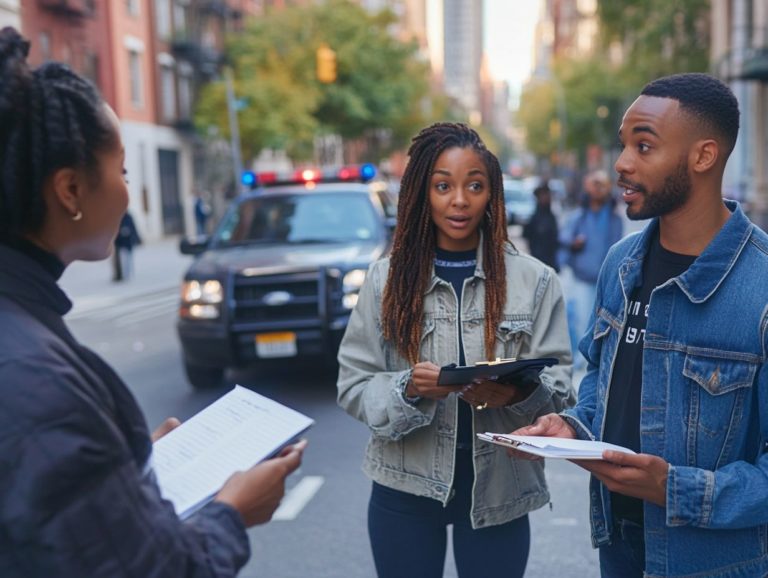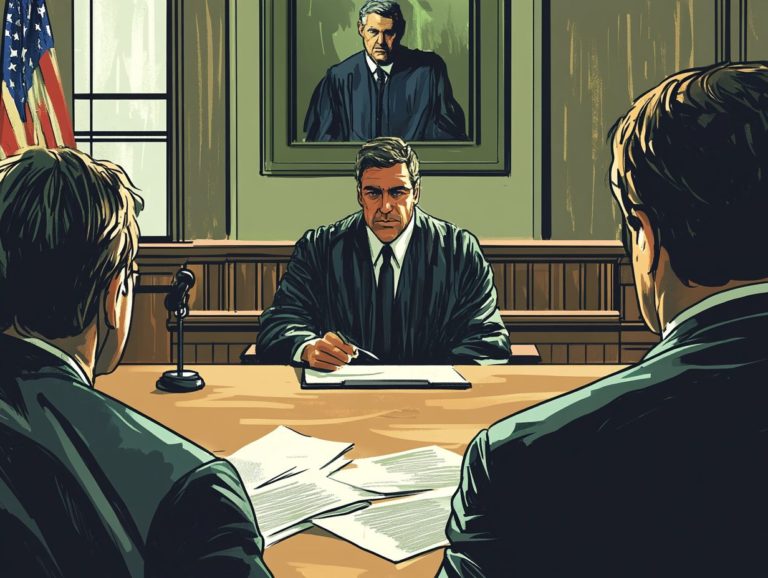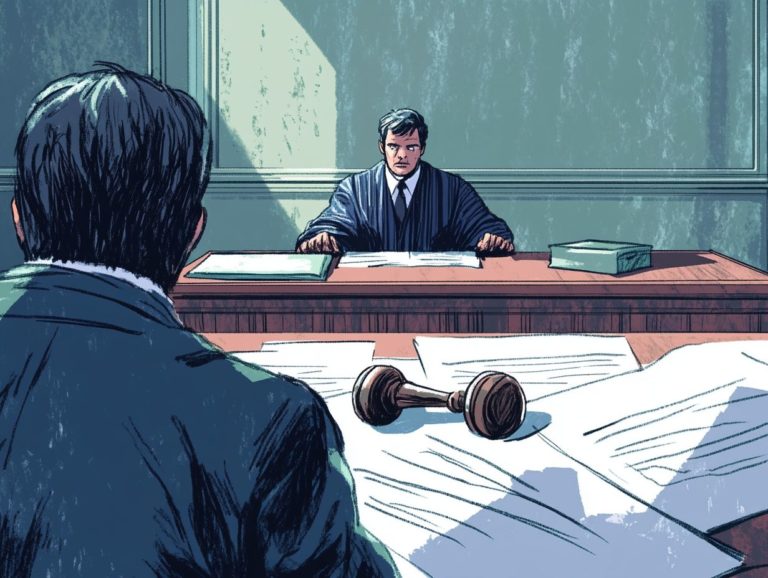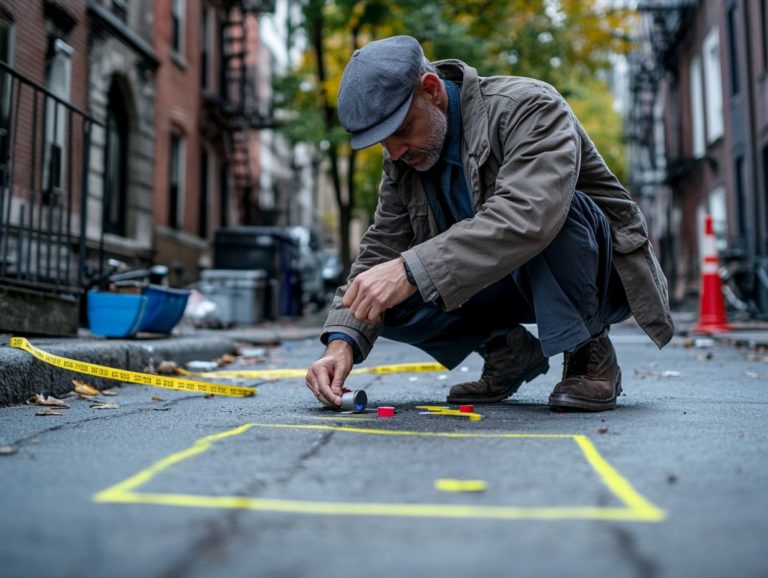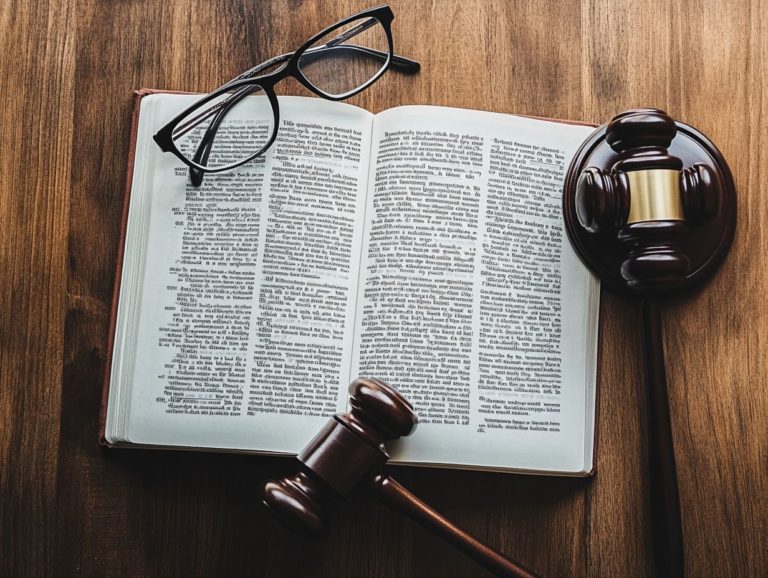How Does Double Jeopardy Work?
Double jeopardy is a crucial legal principle that protects you from being tried for the same crime more than once. Its roots extend back to ancient legal systems, yet its application and interpretation in modern law remain a lively topic of debate.
This article will explore the definition and historical context of double jeopardy. We will also discuss the exceptions to the rule and its implications within the criminal justice system. You ll discover notable cases that have illuminated this concept and examine calls for reform along with potential solutions.
Join us on this intriguing journey as we uncover the vital role of double jeopardy in our legal system!
Contents
- Key Takeaways:
- Understanding Double Jeopardy
- When Double Jeopardy Doesn t Apply: Key Exceptions
- Implications of Double Jeopardy
- Famous Cases and Controversies
- Reform and Criticisms
- Conclusion
- Frequently Asked Questions
- How Does Double Jeopardy Work?
- What is the purpose of double jeopardy?
- How does the Fifth Amendment relate to double jeopardy?
- Can a person be charged with different crimes for the same incident?
- What happens if new evidence is discovered after a person has been acquitted?
- Are there any exceptions to the double jeopardy principle?
Key Takeaways:
- Double jeopardy is a legal principle that prevents an individual from being tried twice for the same crime.
- Exceptions to double jeopardy exist, such as mistrials or new evidence.
- This principle significantly impacts the criminal justice system and has sparked controversy and calls for reform.
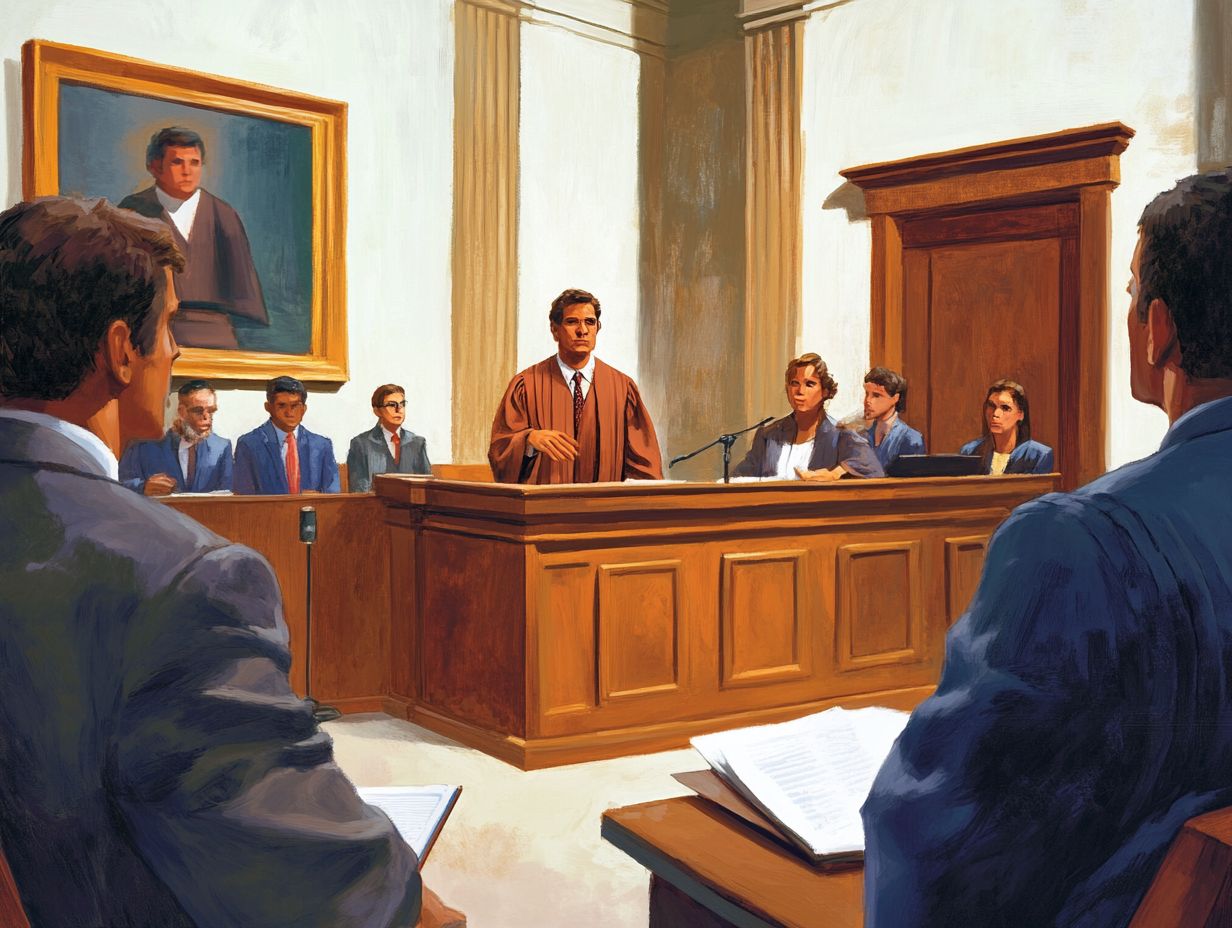
Understanding Double Jeopardy
Understanding double jeopardy is essential for grasping the complexities of the American legal system, particularly concerning the rights of those accused under the Fifth Amendment of the U.S. Constitution.
The double jeopardy clause protects you from being prosecuted twice for the same crime. This principle is deeply embedded in our constitutional heritage, prioritizing fairness in criminal law.
This fundamental principle not only shields you from the burdens of repeated trials but also preserves the integrity of the judicial system. It ensures that once you’ve been acquitted, you won’t face multiple prosecutions for the same offense.
Definition and History
The concept of double jeopardy embodies the legal principle that you cannot be tried twice for the same crime. This doctrine, rooted in Roman and English common law, is established in the Fifth Amendment of the U.S. Constitution.
Over the centuries, this principle has evolved, reflecting society’s changing views on justice and fairness. In ancient Rome, the legal system was designed to protect citizens from government overreach, laying the groundwork for personal liberty.
English law later refined these ideas, incorporating them into notions of due process during the Middle Ages to curb judicial abuse. By the time double jeopardy was included in the U.S. Constitution in 1791, it had become a vital defense against oppressive legal practices.
Landmark court cases have interpreted this doctrine, shaping its application in today s legal landscape and ensuring that you are afforded fair trials without the threat of repeated prosecutions for the same offense.
When Double Jeopardy Doesn t Apply: Key Exceptions
While the double jeopardy clause serves as a vital safeguard under the Fifth Amendment, certain exceptions exist.
These exceptions allow for additional legal action in specific situations, especially regarding civil sanctions and juvenile offenses.
Circumstances Where it Does Not Apply
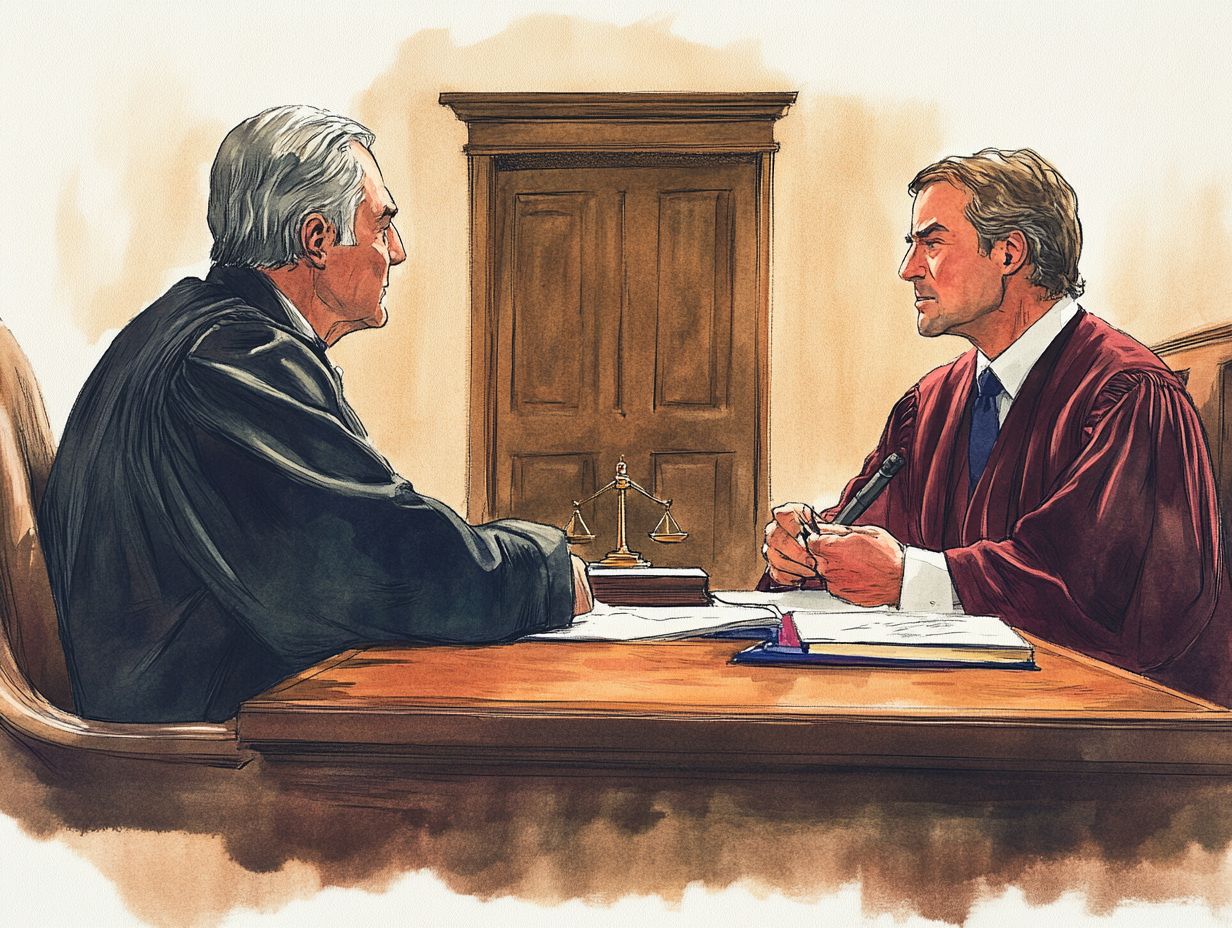
In some situations, the double jeopardy clause does not hold, particularly in cases involving civil property forfeitures or actions taken against you based on different legal grounds.
This distinction is critical in instances like civil forfeitures, where the government can seize property believed to be linked to criminal activity without formally charging you with a crime.
The landmark case of United States v. Halper illustrates how the legal system can navigate around double jeopardy protections. In this case, the Supreme Court ruled that civil penalties could be imposed even after a criminal case had concluded, highlighting that civil and criminal dimensions serve distinct purposes.
This legal framework allows authorities to hold individuals accountable through various channels, reinforcing the intricate nature of the justice system.
Implications of Double Jeopardy
The implications of double jeopardy extend deeply within the criminal justice system, influencing not just individual rights but also shaping broader notions of punishment and deterrence that form the foundation of legal proceedings in trial courts throughout the United States.
Impact on Criminal Justice System
Double jeopardy plays a crucial role in shaping the intricate landscape of criminal law and the rights of the accused. It serves both as a protective measure and a deterrent within the justice system.
This legal principle profoundly influences prosecutorial decisions. It encourages caution in pursuing trials, since losing a case means the defendant cannot be retried.
As a result, defense strategies evolve. Lawyers often craft robust arguments, leveraging the finality that double jeopardy enforces.
The public often sees this principle as a safeguard against wrongful convictions. However, they simultaneously question the integrity of a system that might allow guilty individuals to slip through the cracks.
In this way, double jeopardy both enables and challenges the framework of justice, enriching the conversation surrounding fairness and accountability.
Famous Cases and Controversies
Famous cases and controversies surrounding double jeopardy have significantly influenced legal interpretations and public discourse.
Notable Supreme Court decisions, such as Benton v. Maryland and United States v. One Assortment of 89 Firearms, have played a pivotal role in defining the limits and scope of the double jeopardy clause.
These landmark rulings invite exploration of the complexities of legal protections and their implications in the pursuit of justice.
High Profile Examples
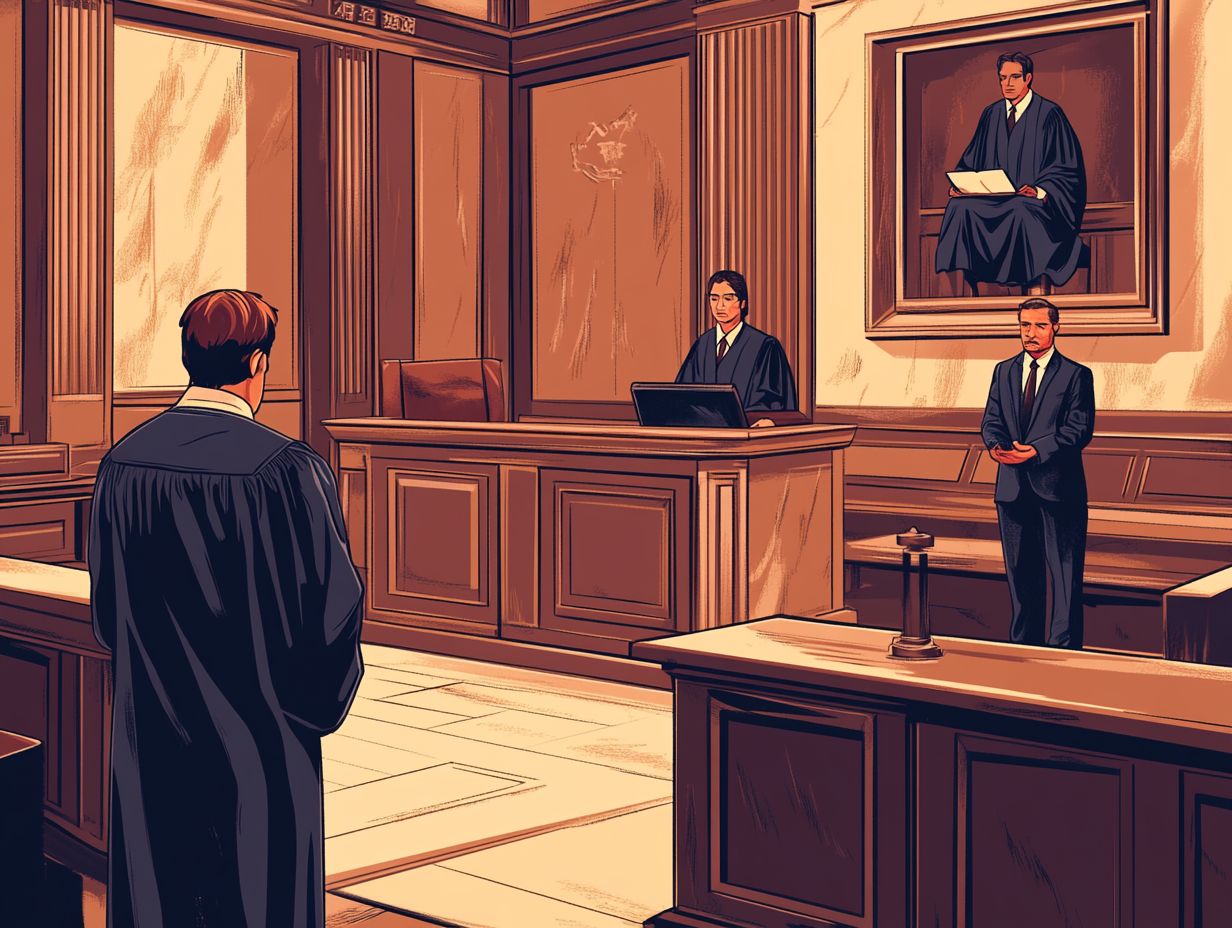
High-profile cases like United States v. Ursery and One Lot Emerald Cut Stones v. United States exemplify the complexities and legal nuances surrounding double jeopardy. These examples reveal the intricate balance between your rights as a defendant and the prosecution’s relentless pursuit of justice.
In United States v. Ursery, the Supreme Court tackled whether the government taking property counts as a second punishment for the same offense. The ruling ultimately determined that it does not fall under double jeopardy protections.
On the other hand, One Lot Emerald Cut Stones delved into property rights and the ownership of evidence in criminal proceedings. Looking at these landmark decisions helps you see the implications of double jeopardy within the criminal justice system.
This principle affects not just defendants but also the broader pursuit of lawful accountability.
Reform and Criticisms
Reform and criticisms surrounding double jeopardy emerge from various stakeholders in the legal profession. These voices advocate for changes that tackle pressing concerns, such as the government taking property.
They highlight the need for a legal framework that aligns with today’s societal values and challenges.
Calls for Change and Potential Solutions
Calls for change regarding double jeopardy often arise from criticisms of its perceived rigidity. This leads to potential solutions aimed at adapting this principle to today s legal landscapes and shifting public sentiment.
As society progresses, there is a growing acknowledgment that the absolute nature of double jeopardy can sometimes allow guilty individuals to slip through the cracks. This ultimately erodes public trust in the justice system.
Advocates propose measures that would enable retrials when new, compelling evidence comes to light. This aims to strike an essential balance between individual rights and the pursuit of justice.
These reforms could bolster the integrity of the legal process, deter criminal behavior, and instill a sense of security among the community.
It s crucial to address these issues now to restore faith in our justice system. By modernizing these laws, lawmakers can foster a more equitable system that effectively addresses the complexities of twenty-first-century legal challenges.
Conclusion
Understanding double jeopardy and its implications is essential for fostering a fair legal system. It s important to engage in this ongoing conversation about how to balance individual rights with the pursuit of justice.
Final Thoughts and Future Outlook
As society evolves, the future of double jeopardy will likely reflect current talks about legal changes. The Supreme Court continues to interpret the rights of accused individuals in a changing legal landscape.
Many factors shape this change, including advances in technology for gathering evidence and shifting societal views on crime and punishment. There s also a growing awareness of wrongful convictions.
Legal experts say these discussions are crucial. They influence protections for the rights of the accused, and future laws may aim for fairness in justice while preventing government overreach.
Lawmakers and activists are actively debating this complex issue. The future of double jeopardy depends on how well the justice system adapts, ensuring the rights of the accused remain a priority.
Frequently Asked Questions
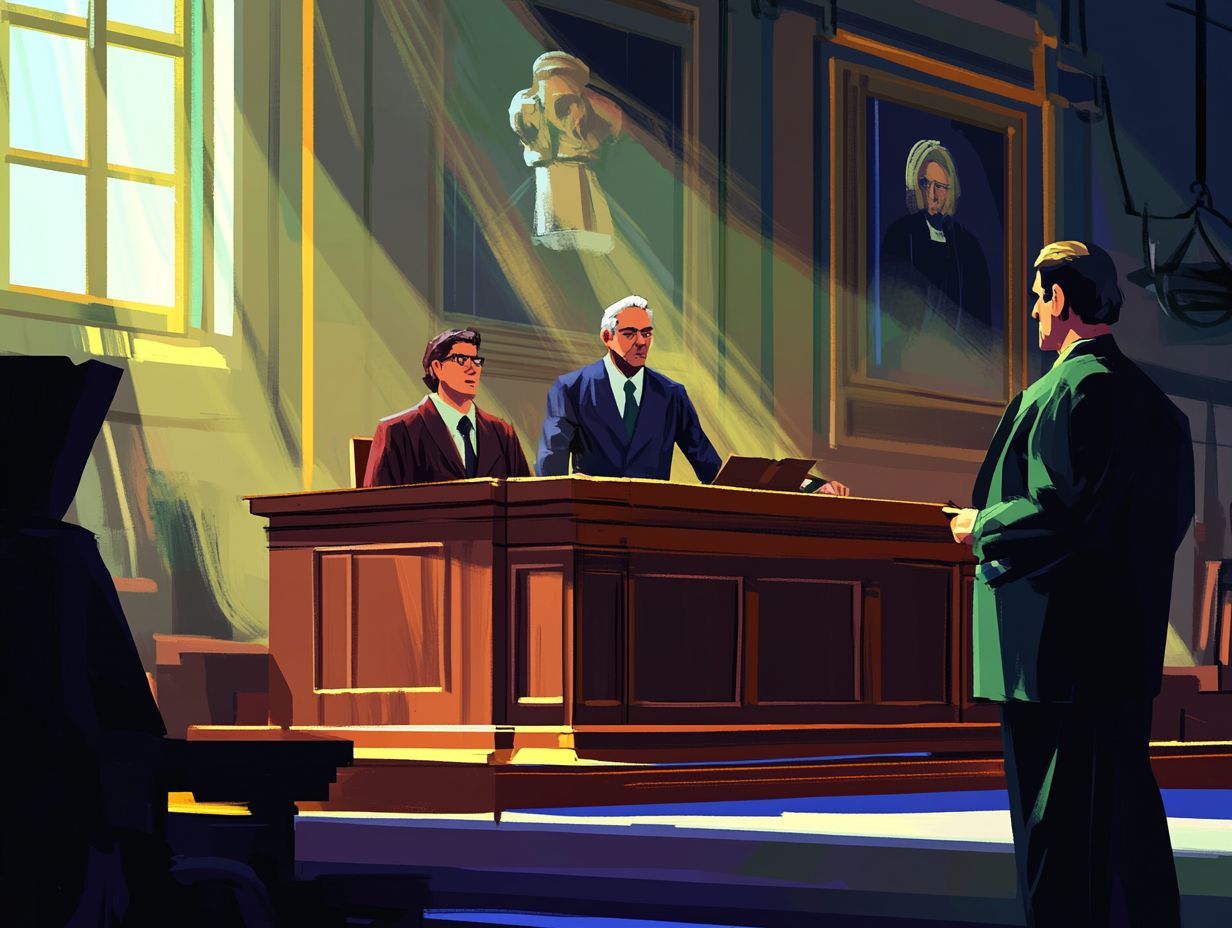
How Does Double Jeopardy Work?
Double jeopardy (being tried twice for the same crime) is a legal principle stating that an individual cannot be tried for the same offense twice.
What is the purpose of double jeopardy?
The purpose is to protect individuals from being prosecuted multiple times for the same crime. This ensures fairness and prevents government harassment.
How does the Fifth Amendment relate to double jeopardy?
The Fifth Amendment of the United States Constitution guarantees the right against double jeopardy. It states that no person shall be put in jeopardy for the same offense more than once.
Can a person be charged with different crimes for the same incident?
No, if a person is acquitted or convicted, they cannot be charged again for any crimes arising from that incident. This is part of the double jeopardy protection.
What happens if new evidence is discovered after a person has been acquitted?
If new evidence is discovered after acquittal, they cannot be retried for that same offense. But if the new evidence involves a different crime, they can be charged for that.
Are there any exceptions to the double jeopardy principle?
There are exceptions, such as when a mistrial is declared due to a hung jury. A person can also be charged under both state and federal laws for the same action, and civil and criminal cases can proceed simultaneously for the same incident.

